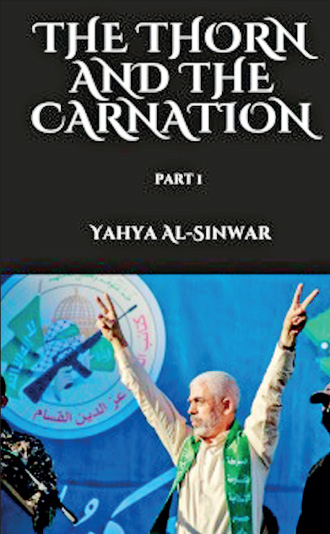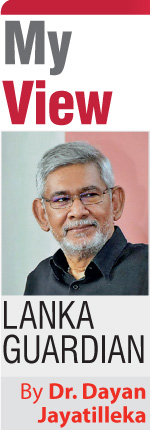Sunday Feb 22, 2026
Sunday Feb 22, 2026
Thursday, 10 October 2024 00:45 - - {{hitsCtrl.values.hits}}

Hamas leader Yahya Sinwar: Personification of Palestinian resistance

Resistance existentialism in literature

Can he prevent a 2/3rds?
 Somewhere in 2011, jazz genius Herbie Hancock made a generous reference to my familiarity with jazz and blues in the LA Times, due to my inputs into International Jazz Day which he initiated at the UNESCO, Paris. This American initiative was unanimously supported by the enthusiastic membership, with every ambassador testifying about his/her indelible first encounter with jazz, a cumulative testament to its unique universality.
Somewhere in 2011, jazz genius Herbie Hancock made a generous reference to my familiarity with jazz and blues in the LA Times, due to my inputs into International Jazz Day which he initiated at the UNESCO, Paris. This American initiative was unanimously supported by the enthusiastic membership, with every ambassador testifying about his/her indelible first encounter with jazz, a cumulative testament to its unique universality.
Mere months later, the US was isolated at UNESCO when Palestine was admitted as a member by over the mandatory two-thirds vote, despite a stern warning delivered in person by US Secretary of State Hillary Clinton who flew in for the purpose. I figured in this battle for Palestine too with photos appearing in Liberation (founded by Sartre) and the international press.
Several months afterwards, all of us reconverged warmly at the first ever International Jazz Day Concert by Herbie Hancock and Friends at the UNESCO auditorium in Paris.
We ambassadors at UNESCO were as admiring of US culture (of which we were partly products) as we were critical of US foreign policy. Today, American dualism-- the egalitarian openness of the US political process (Presidential election campaign, debates) and the downright double-standards of US foreign policy (Gaza, Beirut, Kiev) —is on global display on the same TV newscasts.
Beirut becoming Gaza
Biden supports a ceasefire in Gaza, but knows that it is Netanyahu who sabotaged it. Washington also knows that its efforts to introduce a 21-day ceasefire in Lebanon had won the agreement of Hassan Nasrallah but he was assassinated by Israel mere days after that assent and despite being a factor of restraint in the military conflict.
The US supports the Israeli invasion of Lebanon, which includes the savage bombing of Beirut’s suburbs, on the grounds that Israel has a right to defend its northern territories. But the entire ‘axis of resistance’ including the Hezbollah and the Houthis had repeatedly said they would cease hostilities the moment a ceasefire came into effect in Gaza—an enterprise sabotaged by Netanyahu, not Nasrallah.
The US supports Israel’s right to defend itself and retaliate against Iran’s relatively bloodless missile strike, despite and with no reference to the fact that Israel had bombed Tehran in order to kill Ismail Haniyeh the political head and chief negotiator of Hamas who had just attended the investiture of the newly elected (moderate) Iranian president.
Washington’s silence is morally all the more deplorable since Haniyeh was a constructive partner in the US effort spearheaded by CIA Director Bill Burns to halt the war in Gaza.
Israel’s incursion into Lebanon is depicted by the US as an exercise of the right of self-defence, when its most massive invasion of Lebanon was in 1982 and consequent occupation of Southern Lebanon lasted till year 2000, followed by another war in 2006. Lebanon, a sovereign country, is now being turned into a second Gaza by the monumentally misnamed Israeli Defence Forces (IDF).
Targets: Tehran, Washington
Netanyahu’s massive escalation has a political and electoral intent which is a prelude to a sinister strategic intent. The politico-electoral intent is not merely to stabilise his own position in his coalition and Israeli public opinion, but much more crucially, to tilt the American presidential election in November to Donald Trump.
He is hoping to pull Biden and Harris into the usual, unequivocal pro-Israeli orbit in wartime, and thereby increase the number of Arab-Americans (many of Lebanese origin, not merely Palestinians) and idealistic non-Arab American youth who will boycott the election. Their votes come from the US Democrat base, and without them Trump’s chances of a narrow win increase. Despite this trap, Joe Biden and more stridently, Defence Secretary Lloyd Austin are openly backing Israel.
Netanyahu wants Donald Trump as President because he can then activate his long-standing plan which President Barak Obama halted. That plan, with its ghastly consequences for the Middle East, the USA and the world economy, is a joint US-Israeli attack on Iran, or an Israeli attack on Iran which triggers Iranian retaliation and draws the USA into the war on Israel’s side.
Iran’s nuclear weapons program was stopped by the deal that President Obama negotiated. Netanyahu was always opposed that deal and successfully chipped away at it until Trump came along and unilaterally tore it up. Utterly unprovoked, Trump also assassinated Iran’s beloved General Qassem Suleimani. But in Washington’s eyes, the aggressor is Iran. Though Biden’s domestic economic policies are exemplary, he didn’t have the backbone to revive Obama’s nuclear deal with Iran (or normalization with Cuba).
Protracted peoples war
The Western narrative that the current conflict commenced with the Oct 7th 2023 attack by Hamas, effaces the reality that the matrix of the conflict is constituted by:
a) The Occupation of Palestine by Israel.
b) The apartheid nature of Israeli Occupation.
A year ago, the issue and even the word ‘Palestine’ had almost disappeared from the political lexicon and the global consciousness thanks to the Netanyahu-Trump (or Netanyahu-Jared Kushner) strategy of the Abraham Accords which hoped to capitalise on Saudi-Iranian rivalry to strike a deal behind the backs of the Palestinian people.
Today, due to Yahya Sinwar, head of Hamas in Gaza and now of Hamas itself, author ‘The Thorn and The Carnation’, and architect of Operation Al-Aqsa Flood, the issue of Palestine has been resurrected. Palestine has been burned by Israel’s genocidal war into the consciousness of the world, including college-educated youth on every continent.
With the complete failure and abandonment of diplomacy, or worse, the betrayal of its own diplomatic efforts by the USA—these are certainly not the days of Henry Kissinger, Jimmy Carter or James Baker III—those of us in the Global South are left praying for the children of the region while admiring the resolute spirit of Hamas which has held on underground for a whole year against the most hellish firepower and is still functioning, and of the guerrilla fighters of the Hezbollah resistance in Southern Lebanon defending their home territories against the marauding IDF dragon.
Israel’s genocidal war is creating more recruits for the hard-pressed Hamas, Hezbollah and the Houthis than the IDF in its Herodian hatred can kill off even in infancy.
The militant responses of the colossal crowd at Iran’s Supreme Leader Ayatollah Khamenei’s homily while leading the Friday prayers, also shows that in the event of an Israeli or US-Israeli strike, the Iranian people’s consciousness and collective will are sufficiently strong to sustain a protracted asymmetric war which can inflict unacceptable damage on its attackers for years if not decades.
Continental conflict
The same NATO that celebrated the 50th anniversary of its founding by bombing Serbia for months and helping shatter Yugoslavia along ethnic lines, fails to see that the West’s 1999 ending of Yugoslavia has much to do with the behaviour of Putin’s Russia today. Ironically its case for externally-backed ethnic secession of Yugoslav states and provinces, is the same argument made by Putin’s Russia to protectively carve out a majority Russian-speaking state on its border.
The extreme outcome pushed by Victoria Nuland during the lethal Ukrainian events of 2014, the now-acknowledged (by Angela Merkel) foot-dragging by the West in implementing the federalizing Munich accords on the Donbass, and the recently confirmed (by Nuland) US-UK pressure on Zelensky not to accept the peace accords negotiated with Russia in Astana, Turkey, have all brought Europe to the brink.
The West is contemplating giving Zelensky long-range (British) Storm Shadow missiles which can strike deep into Russia, i.e., Eurasia, as part of the Ukrainian President’s plan for ‘victory’.
Even deliberating on this step marks the most drastic paradigmatic departure from Western policy in the nuclear era, namely the avoidance of anything and the search for a diplomatic solution to everything that would risk a direct confrontation between the West and Russia which had the intrinsic potential to escalate into nuclear conflict.
Recently Russia ‘loosened’ its nuclear doctrine. If a non-nuclear proxy of a nuclear power or bloc fires a sufficiently large volley of missiles sufficiently deep into Russia, then Moscow reserves the right to regard it as a proxy attack by a nuclear power and respond to it by tactical nukes.
At last year’s Valdai Club sessions attended by President Putin, I was the first to speak against a view advocated by my old friend Academician Sergei Karaganov in favour of a pre-emptive tactical nuclear weapons strike on those states backing supply and use of long-range missiles against Russia (he mentioned a Polish town). In his remarks, President Putin brushed aside that uber-hawkish suggestion.
Washington no longer has Russologists like the great George Kennan and London has none like Leo Labedz -- only Russophobes. The West can’t comprehend Russia. If, in place of a negotiated settlement, the West enables deep strikes by a proxy into Russia, I can envisage a retaliatory (not pre-emptive) Russian tac-nuke strike into Ukraine (not Poland)—and not necessarily by Putin.
Fidel’s prophecy
Our contemporary perils were predicted by a secular prophet of our times, Cuba’s President Fidel Castro.
At the Nonaligned Summit in Algiers in 1973, an argument erupted between Libya’s flamboyant leader Muammar Gaddafi and the iconic revolutionary Fidel Castro. Gaddafi denounced both the USA and the USSR as two competing superpowers, both of which were co-equally enemies of humanity and especially the Global South. Fidel roared back that it was a cardinal error to equate the USA and the USSR; that the USSR with all its errors—many of which he had critiqued publicly—was a friend and supporter of the Third World. Most of all it was a counterweight of inestimable value in world affairs. Therefore, there was only one enemy superpower.
Imagine a day, Fidel warned, where the Soviet Union no longer exists. That is the day when the unconstrained imperialists will begin to wage wars as they did in history, to carve up the world. This time they will re-carve the world, overturning the more balanced world order which the USSR had enabled and facilitated.
Fidel proved stunningly correct. In 1999 Yugoslavia was dismembered. In 2003 Iraq was invaded on fake ‘evidence’ of Weapons of Mass Destruction (WMD). In 2011 Libya was bombed by the West and Gaddafi murdered by a lynch-mob. Syria barely survives as a state and ISIS/ISIL has been defeated because of Putin (now the West’s Enemy No 1), Iran’s Qassem Suleimani (murdered by America), and the Lebanon’s Hezbollah leader Hassan Nasrallah (murdered by Israel).
What Fidel Castro warned about so presciently at the Nonaligned Summit in Algiers in 1973, was a unipolar world.
Evils of unipolarity
Everything changed when the USSR fell and the world slid to unipolarity. True, global unipolarity under US hegemony was only a historical ‘moment’ (as even the celebratory Charles Krauthammer essay had it), but all post-World War II rules were torn up by the West during the ‘unipolar moment’.
Though the unipolar moment has been transitioning to something else in the 21st century, the hubris of unipolarity remains, as does the nostalgia for unipolarity. Thus, NATO fantasies of militarily defeating Russia, using Ukraine as proxy.
NATO is fighting to prevent the evolution of a unipolar world order into a sustainably multipolar one. The goal of victory over Russia and scenarios of a conflict with China --where Taiwan plays the role of Ukraine—is part of that western effort to roll-back or contain the evolution towards multipolarity.
The US doesn’t seek to stop Israel from attacking Iran because some part of the decision-making elite believes in Samuel Huntington’s assertion in ‘The Clash of Civilizations’, that China and Iran (the ‘Sinic’ and ‘Islamic’) are natural allies. Thus, the US military-industrial complex believes that defeating Russia and Iran and bolstering Taiwan would make China more vulnerable.
The unipolar project explains the systematic dismantling of nuclear arms control agreements between the USA and Russia. The dismantling was initiated by US President George W Bush, and eventually reciprocated by President Putin. There are hardly any regulatory restraints remaining in the nuclear arms race.
When a system becomes unipolar, it becomes far more predatory than when there is a bipolar or multipolar balance.
It does not matter how benign the unipolar hegemon is internally. Its unrestrained external behaviour, and the even more unrestrained behaviour of its partners/allies/proxies, drives the system over the cliff and all of us with it.
America’s attractive culture, including its transparent political culture, cannot stop the external behaviour of the American state–in turns aggressive, chaotic and ineffectually benign—in an international system without equilibrium; a system which is either unipolar or not yet bipolar/multipolar i.e., balanced, in any stable sense.
As Antonio Gramsci famously said, “the crisis consists precisely in that the old is dying and the new cannot be born; in this interregnum a great variety of the most morbid symptoms appear.”
Insofar as the contemporary world-system is defined by a dying yet aggressively counterattacking unipolarity, and an unevenly evolving multipolarity, the world will remain on the brink.
Whether the system is international or national doesn’t matter. Whether the hegemonic power is internally enlightened or not isn’t the primary question. What matters is the system and its configuration.
A staunch opponent of unipolar hegemony, I am an advocate of counter-hegemonic asymmetric resistance, internationally and nationally—i.e., the politics of resistance. Here’s an essay by me (2019) on the subject which proves that mine is no reaction to current domestic electoral dynamics, but a considered view.
 Counter-Containment of Unipolarity: Dialectical Realism as A World Outlook
Counter-Containment of Unipolarity: Dialectical Realism as A World Outlook
https://eng.globalaffairs.ru/articles/counter-containment-of-unipolarity/
Save Sri Lanka from unipolarity
If the system is in a unipolar moment and that hegemonic political power also has something internally undemocratic and distorted, catastrophe is assured.
The JVP is not (yet) a normal party of the Marxist Left, leave alone the pluralist democratic Left.
Lenin’s article ‘the Third Congress of the RSDLP’ and his famous book about that Congress, ‘Two Tactics of Social Democracy’ appeared in 1905 when the party was defeated and underground. The JVP has been quite legal for 30 years, yet, incredibly, the JVP’s Party Congress dates, deliberations, debates, decisions, and documents remain unavailable, invisible, secret.
We don’t know what its last Congress endorsed, which is absolutely relevant because its decisions govern the JVP today, and the JVP leader is the NPP leader.
Not all names of the JVP’s decision-making Politbureau and Central Committee are in the public domain. Wijeweera created a two-tier structure which he called “the Party of the Bell” (the electoral symbol) and “the Modern Bolshevik Party”; the first ‘outer’ and ‘above’, the second, ‘inner’ and ‘below’. The JVP still has that two-tier structure.
For a political scientist like myself who has had two books published in London on revolutionary and communist experience, these structural anomalies are akin to a suspicious, shadowy mass on a scan report that a consultant medical specialist detects and can’t unsee.
The JVP is to the NPP administration what the ‘Deep State’ is to a government. With a 2/3rds parliamentary majority, creeping control through ‘salami tactics’ is highly probable.